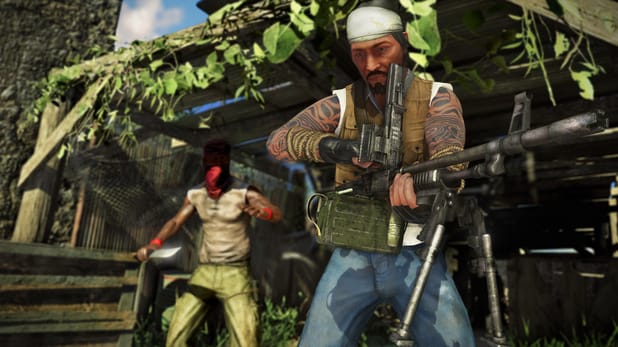"Why is the player on the side of killing?": a conversation with the writer of Far Cry 3

Every year, a spate of blockbuster first-person shooters released throughout November and December fan the holiday shopping flame. This inevitably gives new oxygen to the debate about the nature of violence in videogames and the pleasure we draw from performing unspeakable acts.
Jeffrey Yohalem, the lead writer for Ubisoft’s Far Cry 3, is less interested in using videogames to explore real-world conflict than he is in telling the story of our current lost generation that has escaped behind its screens. I caught up with Yohalem shortly before the North American launch of Far Cry 3 to talk about his inspirations for his latest work, and the merits of using videogames to question our relationship with videogames.
So you used to work on The Daily Show, which seems theoretically like such a different experience than working on Far Cry 3.
The heart is in the same place actually. The Daily Show tackles issues that they felt weren’t being tackled in the news at the time. They did it by being a “fake news organization,” but more real than The Onion, say, which is a satire. The Daily Show walked the line between satire and real news.
Yeah, it’s able to ask questions in a way that quote unquote “proper journalists” wouldn’t deem appropriate.
Exactly. And Far Cry 3 walks the line between satire and a real game in the same way.
Is it a satire of the shooter genre?
It’s not a satire, because for me satire is ironically keeping yourself distant from immersion. But I think it walks the line between those; it’s a meta-commentary of videogames. So it’s talking about not just shooters, but videogames as a whole, and what we’ve turned a blind eye to in videogames. Videogames have all these tropes that they use again and again because they’re easy to design for. I tried to do something where we take those tropes and we subvert them so that they become revealed. We’re revealing what’s weird about these tropes, and also we’re trying to explore them from a fresh perspective.
A concept that comes up a lot for military-ish shooters is realism. But did you not have in mind a realistic experience with Far Cry 3?
Not at all, and I’m trying to use the unsettlement of it not being realistic. It’s walking the line between realism and something more fantastical like Bioshock. I don’t know if you’ve seen the film A History of Violence?
Oh, yeah.
Cronenberg for me is commenting on violence in film. There are a lot of elements in the plot that are fantastical and don’t really work if you treat the film as a realistic drama. But the minute you see that the point of the elements is to call attention to the silliness of other plots, then you feel like: Why is he doing that?
So the same thing is true of Far Cry 3. If you approach it as a realistic shooter, there’s a lot in there that will end up disturbing you and that’s intentional.

So what’s a particular instance where you’re trying to do that?
Well for instance there’s a torture scene in Far Cry 3 that is trying to call to attention to how strange and unsettling torture scenes in videogames are. The context of that torture scene in Far Cry is meant to really shock the player in a way that other torture scenes in games try to make the player feel comfortable with torture. We’re trying to do the opposite. The use of sex and violence in the game is similarly calling attention to appropriate and inappropriate uses of those things.
What games are you referencing when you say that videogames make you feel comfortable with torture? Is it that kind of Black Ops moment where you’re shoving glass into a man’s face, something like that?
Usually it’s on a less extreme level, because they want you to feel comfortable. Any game that involves interrogation techniques, or beating someone up so you can get information, those games are all about the excitement of forcing someone else through violence to tell you something. In Far Cry we try to change that experience because the person that you’re trying to get information from is someone that you actually feel very uncomfortable doing it with.
I hadn’t even thought about that. Have you played the new XCOM at all?
I haven’t.
One of the things you can do is capture aliens alive—which is very difficult to pull off—but then there’s just an “interrogate the alien” button, which is a routine gesture in your base management.
It sounds like you’re saying that they gloss over this idea because it’s a gameplay tool. And so the whole thing that we try to do with Far Cry 3 is: there are all these mechanics that have been created in videogames and they give the meaning of what the story should be about. I’m turning the lens back on the mechanics themselves and saying, “What do these mechanics make you feel?” The point of the story is to utilize that mechanic to convey a meaning. The game is about what the player is doing, the acting that the player performs in the game through all the mechanics. It’s not about the player just doing a bunch of things like killing.
That’s the incredible opportunity I’ve been given here, to talk about escapism within the medium that is used for escapism.
At the beginning of the game, your character is very shocked by the violence he is performing. But then at a certain point—I don’t know if I’d say you have to become more comfortable with it, but you have to at least get accustomed to the behaviors that you’re going to be doing to complete the game. I saw that as a way to try to get around that issue of likeable human protagonists also being mass murderers. Was that how you tried to situate the origin story for this character?
I wanted that to be a positive thing rather than a negative thing. Creativity is about operating within constraints, and so gameplay is the constraint that the story should operate in. A lot of writers don’t actually take that constraint. They just say, “Oh I’m going to tell whatever story I want and not pay attention to the gameplay.” That’s where ludonarrative dissonance comes from. In this case, I know what this game is about. So that moment of Jason being an ordinary person who then has to do this stuff, if he gets good at it quickly it’s because the player is already good at it. If the player is bad at it, then he becomes good at it slowly. So it’s really about how good the player is, and that’s the point. If the player is a really seasoned first-person shooter player, then I hope that players who feel like Jason becomes good really quickly say, “That’s interesting because maybe I’m pretty good at killing in videogames. And what does that say about me?”
How do you adjust the tone of the story based on Jason’s reaction? A lot of writers I’ve spoken to, particularly for shooters, say that given the perspective where you’re literally looking through this character’s eyes, they always try to mask any sense of character that might contradict what the player is saying or feeling.
I think it’s completely the opposite. Basically, for me the player is a character in the videogame. If you pretend the player is not a character—when you create a protagonist who doesn’t exist, you’re also ignoring the player to some degree. Because the only person you can understand in the videogame is the character you’ve created. For example, Gordon Freeman is a very interesting, complex character. But he’s also sort of a non-character. You learn all these things about his background in the first level; the beginning of Half Life is like the beginning of a movie. He takes an underground tram to work, all the other scientists respect him, he’s doing really secretive, cutting-edge research in a laboratory. The level design conveys who he is.
In Far Cry 3, Jason is a character and he’s not the player. The player is another character in the game. Sometimes Jason disagrees with the player, and sometimes Jason agrees with him. And the magic of that is that then it doesn’t matter! Basically, as long as the whole narrative is directed towards what the player is feeling—which for me is how videogames should be—then I get to target Jason as a resource where players can go: “I disagree with Jason.” And the player gets to convince Jason to do something else. So instead of trying to force the two of them together, I’ve decoupled them.
It sounds like you’re trying to do a lot of interesting things with player choice and the way those choices influence that actual character. But, well, how do you pull that off? A lot of games that profess these intentions give you explicit choices—you can kill this person or save this person. From what I’ve played of Far Cry 3, it doesn’t seem like it is showing moral structure of the game that nakedly.
Exactly. I feel like a lot of games turn the volume to eleven, or they turn it to one—where it’s nonexistent. We’re operating in the middle, you know what I mean? For example, I get a lot of questions from people asking if I break the fourth wall. For me, that’s eleven. If I break that, then it’s loud. It’s like screaming. Portal is a great example of a game that didn’t do that. It’s about games, but at the same time it’s not breaking that.
I approach videogames like a director in theater or film, and the player is treated as an actor. For me, that kind of binary choice, that’s the same as saying to players, “Here’s what I think!” If the director goes to the actor and says, “I want you to cry in this scene,” that’s a bad director.
There’s been a lot of that in videogames. The writer’s job, or the director’s job, is not to force an opinion on the player. The job is to create a space where the player can experience an opinion.
So I think that kind of binary choice, except in key moments, is not really allowing the player to act. Because a lot of the time, the choice isn’t clear—what the implications of what the player is deciding are. In Far Cry 3, the game is about what the player does with the gameplay. What allows the biggest freedom are all the shooting mechanics, the RPG mechanics, and the open world missions, the things going on in the game. Because then as a player, I can control what I’m doing to such a degree that it expresses—it’s like an actor performing. An actor can express a huge range of emotions in a performance.
So the story of Far Cry 3 is what is told through what the player is doing in the game, which is hugely complex and allows every player to have a different experience. The story that’s told through Jason is one of the experiences that the player talks to. And then, in my mind, the whole experience is about freedom. It’s about the player experiencing this Never-Neverland island and deciding if they want to be there or go and save Jason’s friends. And I think that question is really interesting, because they’re Jason’s friends, they’re not the player’s friends.
I love when people online talk about, “Oh I don’t understand, the game tells me I’m saving Jason’s friends, but then I’m going off and doing all the open world stuff and I’m not doing any story missions.” But that’s the story of the game. Players are choosing that to such a degree that they think this is all an accident. But it’s not!

Far Cry is unique among AAA game franchises for how different each installment has been, and your previous work in games has mostly been in Assassin’s Creed—which is much more rigid in terms of the amount of control an individual writer or designer has for a single game. What elements from the original and Far Cry 2 did you want to preserve in this one, and what did you want to change?
Far Cry was an exciting opportunity because of how open it is. There’s this chance to really tell something modern and daring that I couldn’t do with Assassin’s Creed. For me, Far Cry is about: be careful what you wish for. Far Cry has this unreal sense of fun.. The fact that you were this guy in a Hawaiian shirt, that’s not the main plot but that’s what’s kind of Twilight Zone to me, kind of weird but interesting. And then Far Cry 2 was about the moral issues surrounding colonization, a sort of Heart of Darkness and Apocalypse Now game.
And so I married the two of them in this game. What I took from the Apocalypse Now side was the story about the ruin of that generation by the Vietnam War. Like Deer Hunter, too. If you notice, the opening of Deer Hunter is a lot like the opening of Far Cry 3—where you have a group of people who are very happy and enjoying their lives. For me, Far Cry 3 was about the threat to generation Y in a way that the Vietnam War was a threat to the generation in Apocalypse Now.
And then Jason Brody wants to escape. He wants escape the threat of generation Y, which is: the way the economy is going now, there are no jobs for kids, the way that people are living with their parents into their thirties, the way that people are having trouble growing up, the way that the world is running out of mentors, the way that society seems to be developing a complex web that’s like a pyramid scheme that manipulates the young people who come into it in favor of the people already in the system. Jason is escaping from that, rather than engaging in that world. That’s what he wishes for: escape.
I see what you’re saying about these thematic questions of a lost generation, or the existential angst of different generational periods. But how do you approach that in the very explicit form of a shooter? When you were just talking, my mind jumped to something like Bret Easton Ellis’s Less Than Zero, Lena Dunham’s Girls, something like that.
Well that’s what’s incredible about this medium. Because the reality is, it’s a perfect way to express this because videogames themselves are the place that people escape to. Jason, when faced with all this stuff in his world, might escape to a videogame. So basically, Far Cry 3 is that videogame. But it’s aware of what it is. That’s the incredible opportunity I’ve been given here, I think, which is to talk about escapism within the medium that is used for escapism.
Far Cry asks the question: what is it about this gameplay that is so enticing? What is it about the loot and rewards structures that cause you to be more attracted to this than the real world?
A lot of this was sparked by hearing Jane McGonigal’s TED Talk about gamification. Because it kind of seemed like all of society was going towards this place where you create false value. You basically create a virtual gold star, and you try to get people to be interested in gaining that gold star. That’s gamification—you reward people with this virtual, valueless item that the company puts rewards loops on. There are arguments in the game that are taken form that talk. They examine whether that’s good for people or not.
I wonder: does all this questioning about the violent impulse in gaming ever replace the initial impulse itself? Whether or not you’re asking yourself about it, you’re still just getting a rush from seeing someone’s head explode in front of you.
My feeling is that a film like A History of Violence asked very interesting questions and it’s profoundly affected me and my experience with film. Yes, it is a very violenct movie, and at the end of the day you could say, “Well it uses the same techniques as those other films but calls into question those same techniques simultaneously.” I think that the medium right now is ripe for that kind of examination, and it hasn’t really been done.
A lot of games are talking about killing as human, which is different than killing in videogames. Is killing a good thing in the real world? That’s not the question this game is asking at all. It’s not an examination of human beings as killers in reality. It’s an examination of what you feel when you play a videogame. And I think that question is fresh still, and worth examining.
By the way, I’m a big fan of Girls. I really, really love it. And I think our generation is starting to have people speaking for it. It’s a different take of what’s going on in the world, because our generation is very optimistic and believes that anything is possible and then they encounter a world of power structures built around politics, built around charisma and not necessarily good ideas. And I think it’s very shocking because education didn’t teach people any of that. Education is devoid of teaching about corruption or the realities of life. Girls is about that issue; Far Cry is about that issue.
It’s not about the rush that we feel when we kill things, it’s about why is Jason on the side of killing and why the player is on the side of killing, which is a very different question. I don’t know if I’ve explained the subtlety of that, but part of what I’m trying to do with Far Cry is ask the question overall of whether life should be easy and fun, or whether it should be difficult and rewarding. And what love is, also. I was very much inspired by an article that Jonathan Franzen wrote in the New York Times about falling in love with tech devices. It’s called something like, “Liking is for cowards. Go for what hurts.” Basically, you could say that article inspired this game. Real love, he argues, is painful and hard. And a lot of times, not fun. It’s work. This tech love, on the other hand, is all fluff. It mirrors yourself back at you.
This game is an examination of that issue. The game attracts people like a tech device. Gameplay loops are based on tracking people without being hard.



